17 Emergency Medical Technician Resume Examples
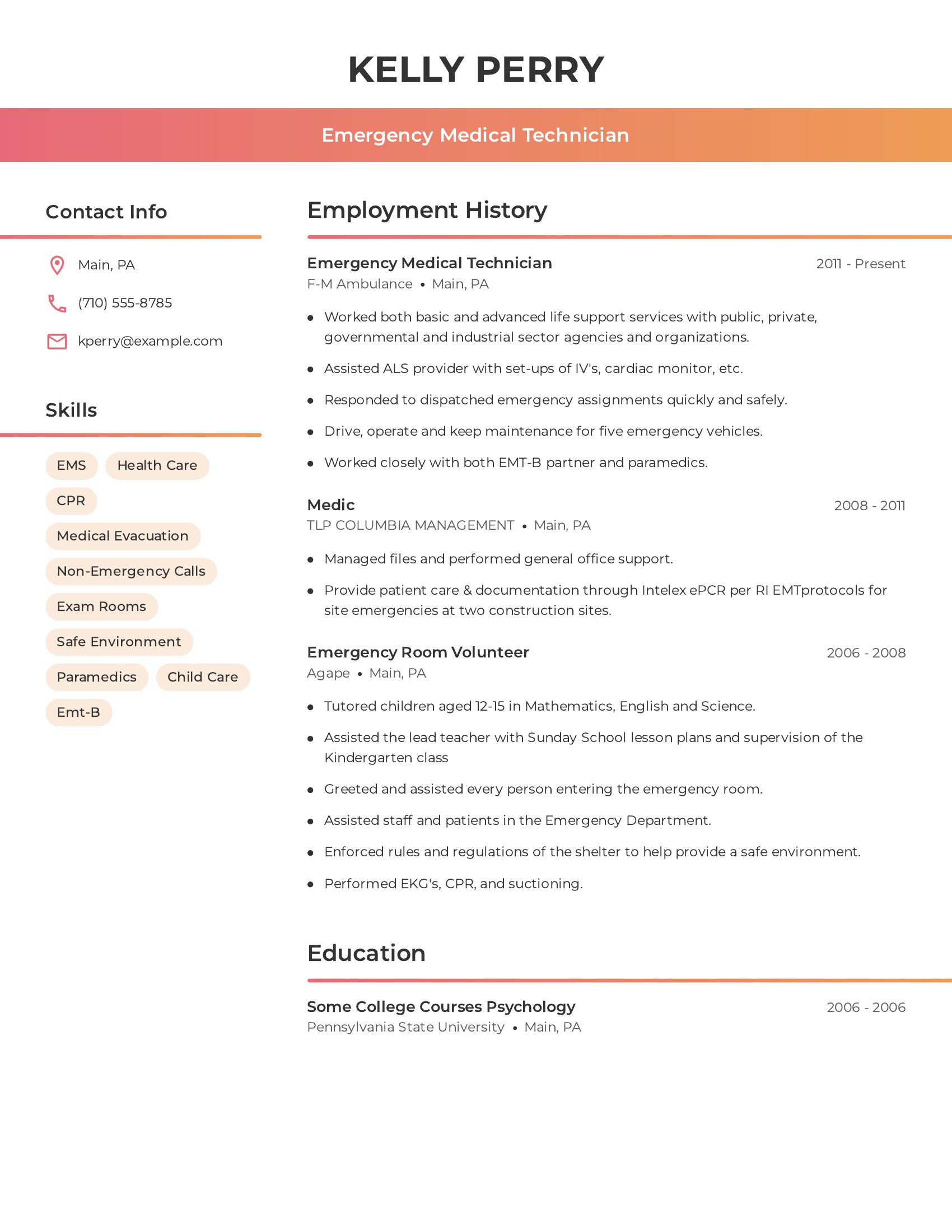



Emergency medical technician resumes should highlight relevant experience, certifications, and skills crucial for the role. They must include contact information, employment history with specific duties, education background, and a list of pertinent skills. Clear, concise descriptions of job responsibilities and achievements help demonstrate the candidate's proficiency and suitability for the job.
In this resume, the candidate has effectively listed their job titles, employment dates, and duties performed in each role. They have included relevant skills such as CPR and medical evacuation. The employment history is detailed with specific tasks like assisting ALS providers and responding to emergency calls. The education section briefly mentions relevant coursework. This resume clearly shows the candidate’s experience and capabilities as an emergency medical technician.

Paramedic resumes should showcase relevant experience, certifications, and skills essential for emergency medical care. A good resume highlights hands-on experience in patient care, proficiency in life support protocols, and the ability to respond effectively to emergencies. Additionally, including certifications like CPR and BTLS is important, as they emphasize the candidate’s preparedness for critical situations. Education background related to medical training further strengthens the resume.
This resume includes specifics such as detailed job experiences in ambulance services where the candidate provided both basic and advanced life support, monitored patients' conditions, and responded to emergency calls. The candidate holds certifications in CPR and BTLS, which are vital for a paramedic role. The resume also lists relevant skills such as patient care and emergency response. The inclusion of a bachelor's degree in a related field adds to the candidate's qualifications.
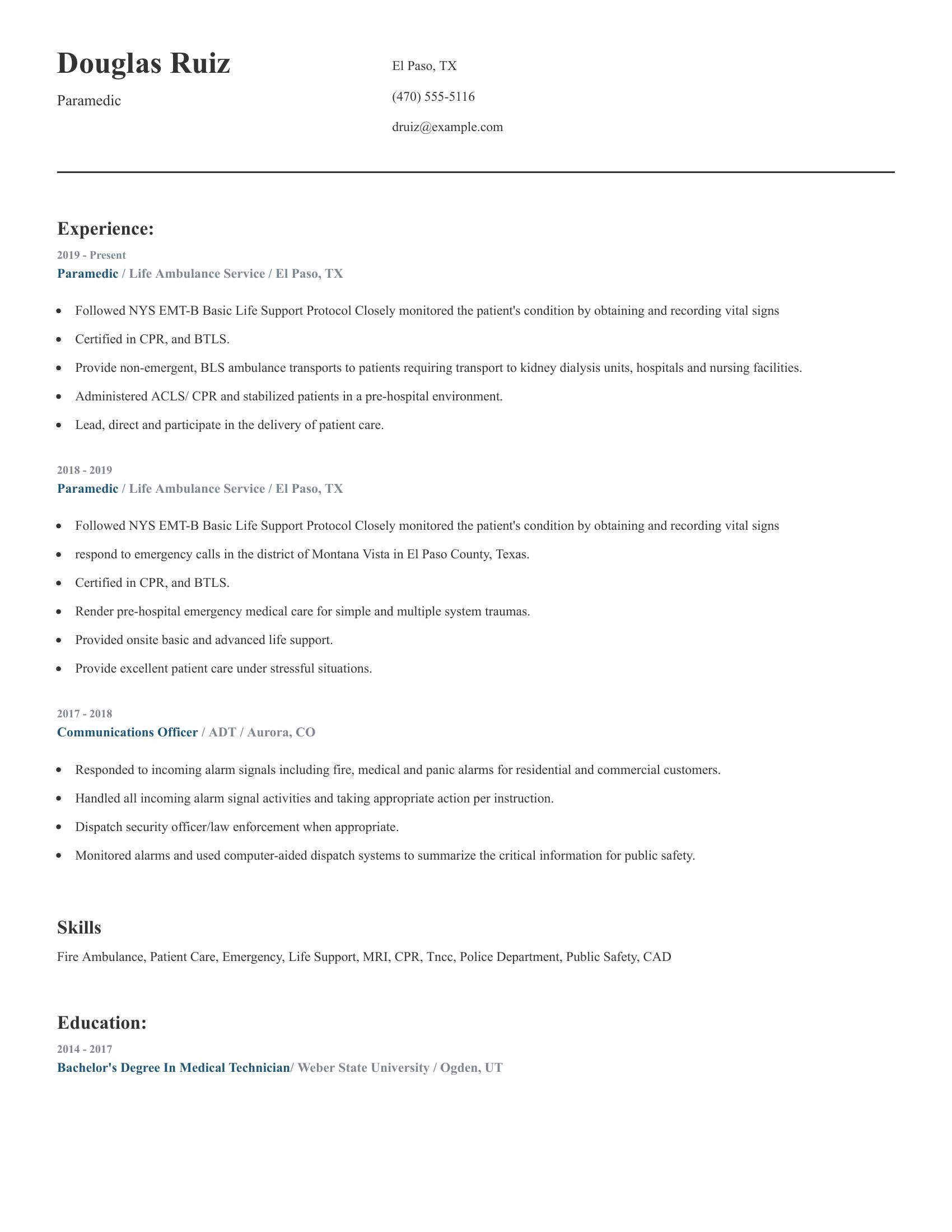
Ambulance driver-paramedic resumes should include work experience, certifications, and relevant education. Experience with emergency medical services and life support systems is important. Skills like operating medical equipment and providing patient care are essential. Certifications in advanced life support and CPR demonstrate preparedness for emergencies. Education in medical technology or related fields is also valuable.
This resume highlights extensive experience as an ambulance driver-paramedic at two medical centers. It lists specific duties such as administering life support, operating medical equipment, and transporting patients safely. The resume includes certifications in ACLS, CPR, and BTLS. Additionally, it mentions earlier experience as a park ranger, showcasing emergency response skills. The educational background in medical technology is also noted.
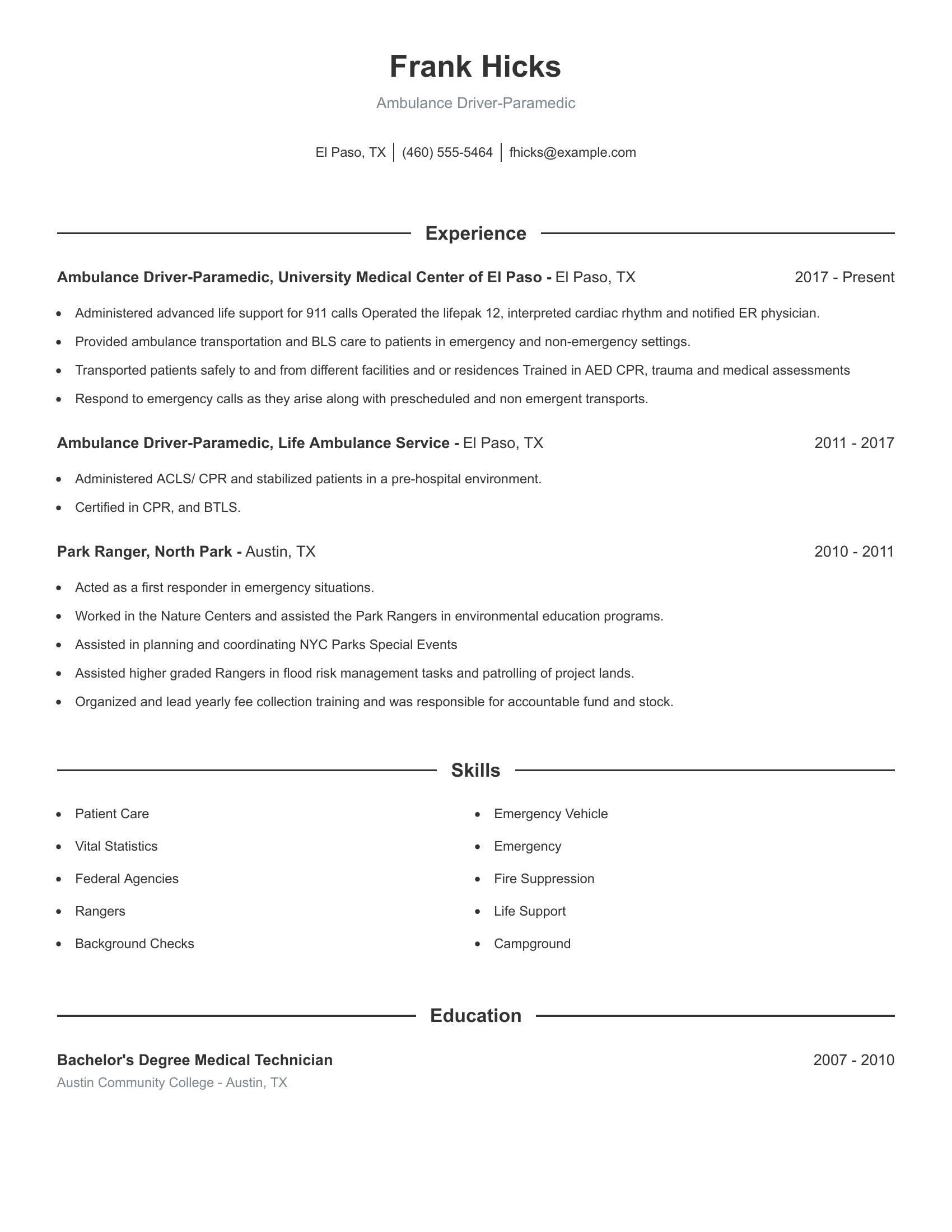
Emergency room technician resumes should include relevant job experience, clear description of duties performed, and skills related to emergency care. It should also list any certifications, education, and knowledge of medical equipment. The resume must highlight hands-on experience in patient care, ability to perform under pressure, and teamwork skills.
This resume includes specific details about job roles, such as collecting vitals, initiating CPR, and assisting with dialysis machines. It shows experience in different healthcare settings and a range of skills like IV administration and EKG testing. The resume also lists relevant education and various medical skills, making it comprehensive for the role.
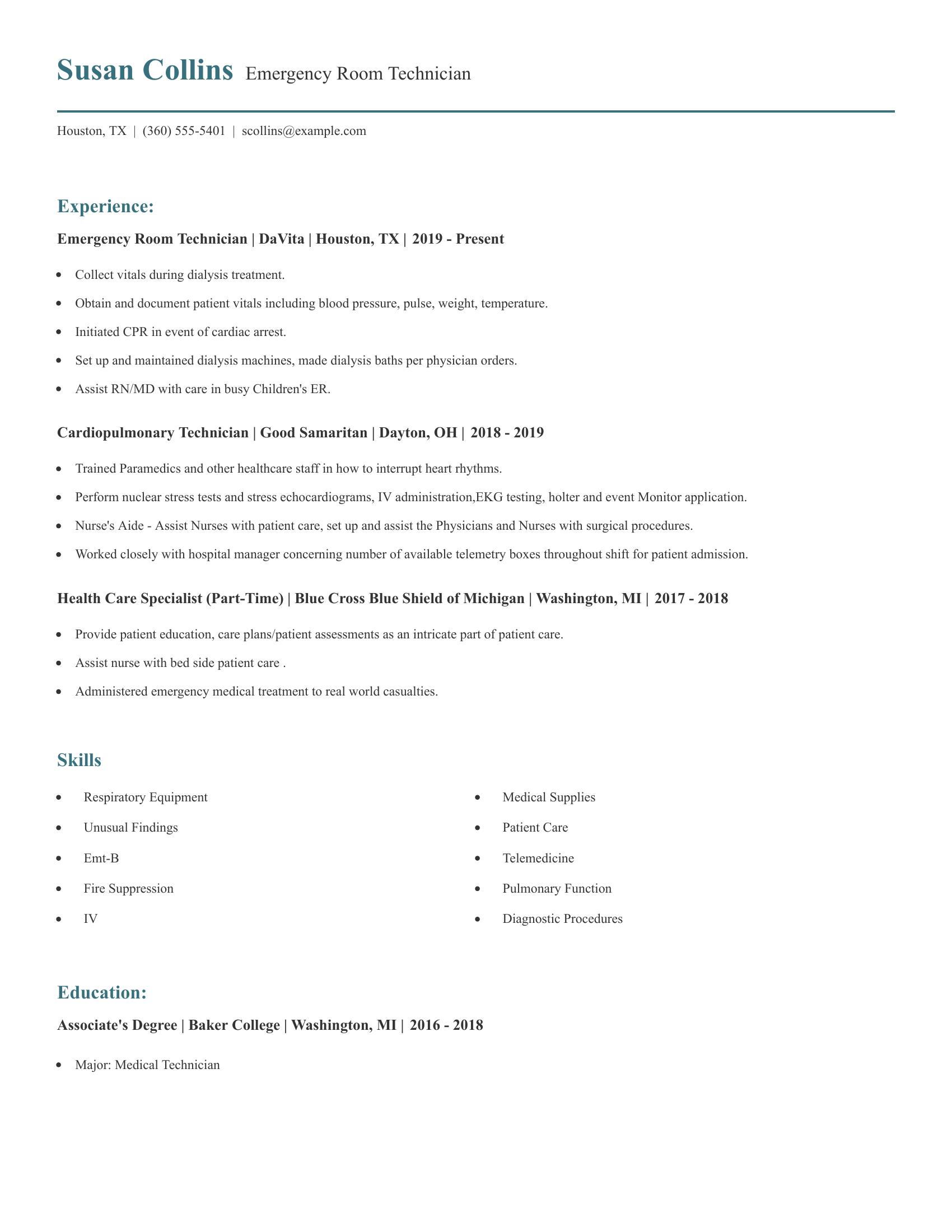
Firefighter/paramedic resumes should include professional experience, certifications, and relevant skills. Key elements include detailed job descriptions demonstrating proficiency in emergency medical procedures, fire suppression, and incident command. Certifications like CPR and EMS are important. Experience in different settings such as ambulances, fire departments, or dispatch centers is valuable. Leadership roles and budget management can also strengthen the resume.
This resume includes professional experience as a firefighter/paramedic with detailed job descriptions and specific duties performed, like administering life-saving techniques and responding to emergencies. It lists various roles held over a long career span, showing growth and leadership experience such as being a fire lieutenant. The resume also highlights essential certifications and skills relevant to the profession.
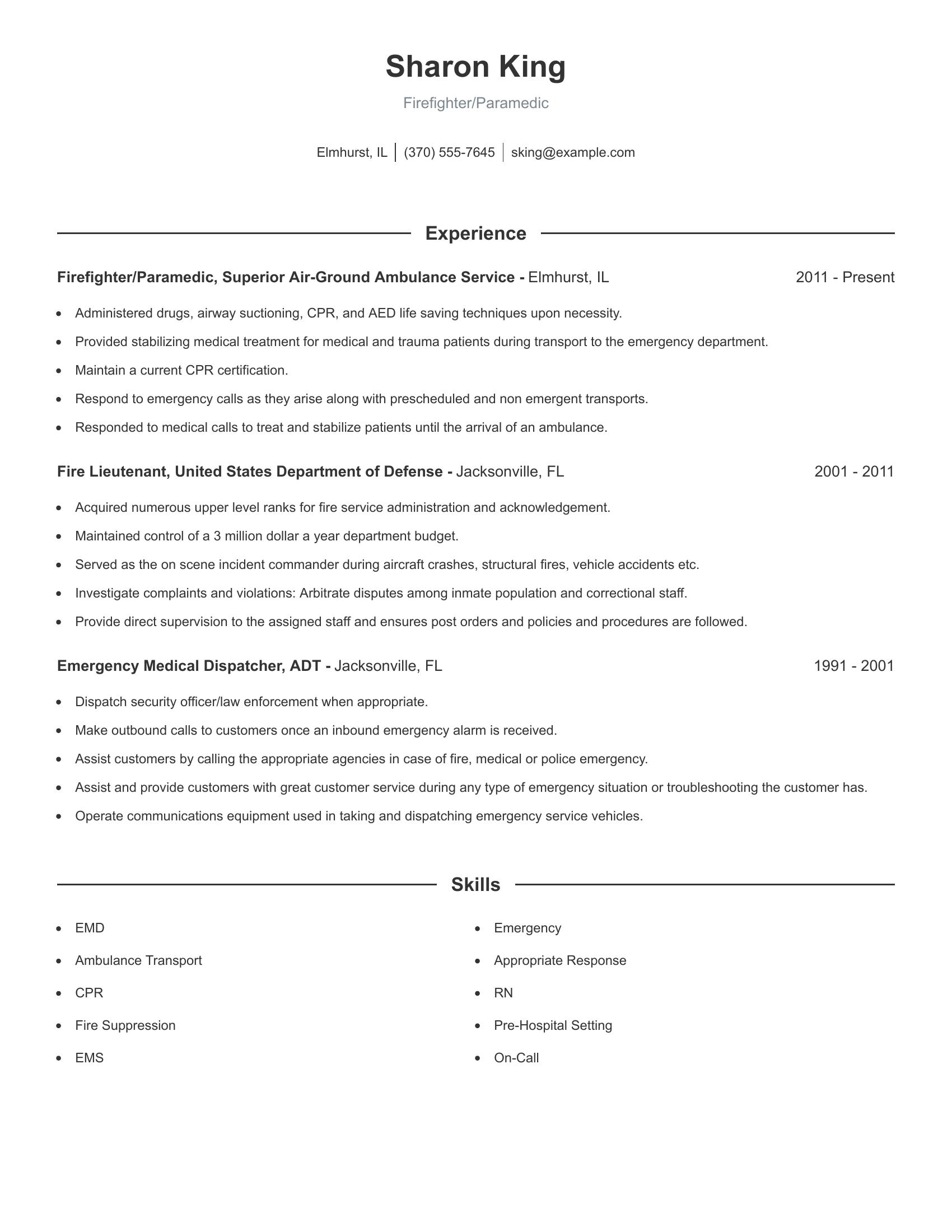
Emergency response technician resumes should focus on relevant experience, certifications, and skills. Good resumes list job titles, employment dates, duties, and achievements. They also include certifications like First Aid and CPR, which are important for the role. Experience in handling emergencies, using specific tools or databases, and working in various environments such as flood zones or spill areas is also crucial.
This resume highlights job titles and dates of employment effectively. It details the candidate's emergency response experience at two companies, including tasks like airway maintenance, CPR, and hazardous material cleanup. The resume lists relevant certifications and specific skills like using a medical database. Previous roles related to mental health show the ability to handle crisis situations, adding depth to the candidate's qualifications.
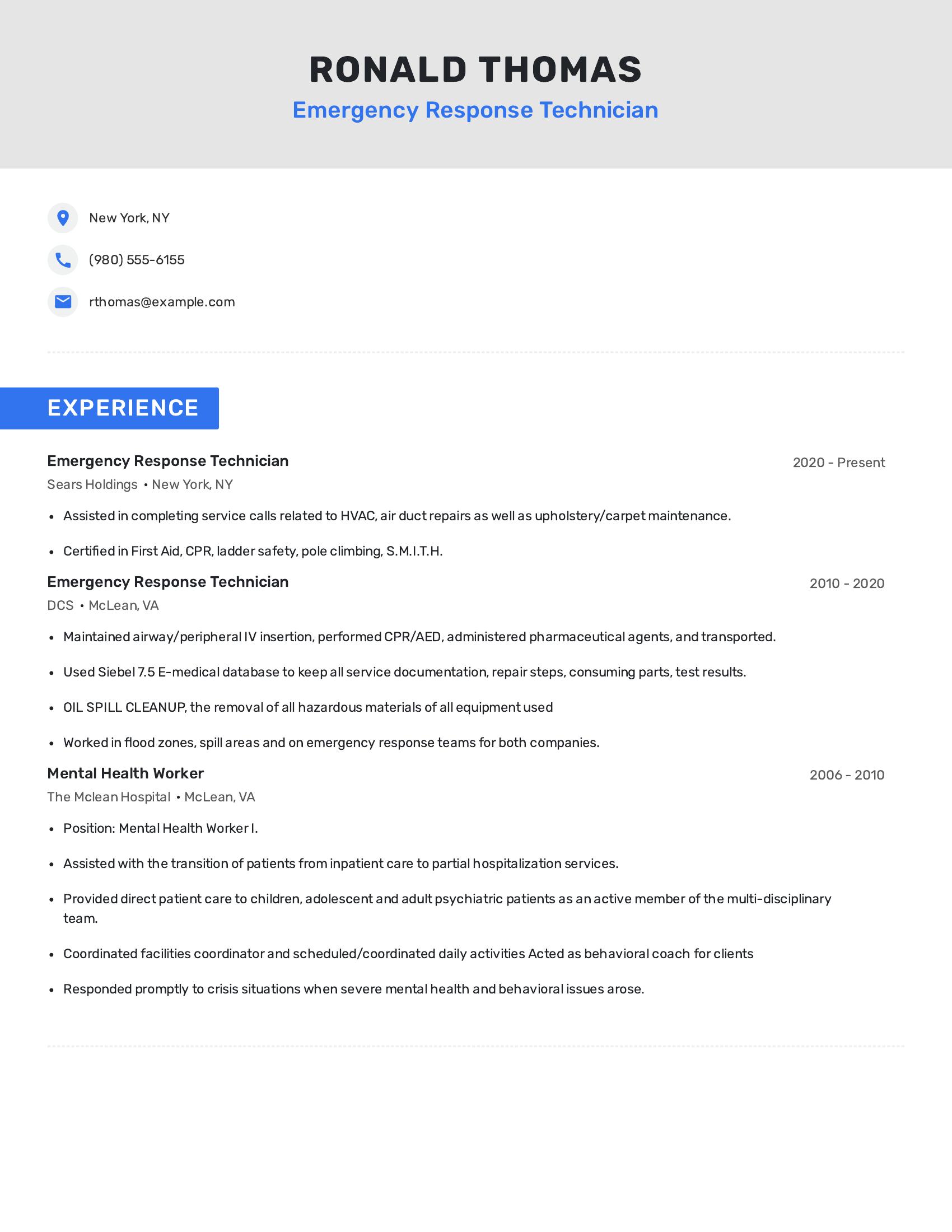
Outdoor emergency care technician resumes should include relevant work experience, specialized skills, and education in the medical field. The resume should emphasize hands-on patient care, collaboration with healthcare professionals, and familiarity with emergency procedures. Including certifications like CPR and specific technical abilities adds value.
This resume highlights pertinent experience in various healthcare settings, showcasing roles such as an outdoor emergency care technician and patient care technician. It includes specific tasks like assessing vital signs and assisting RNs and physicians. The skills section lists important competencies such as respiratory care and hazmat handling. The educational background, though brief, is also noted.
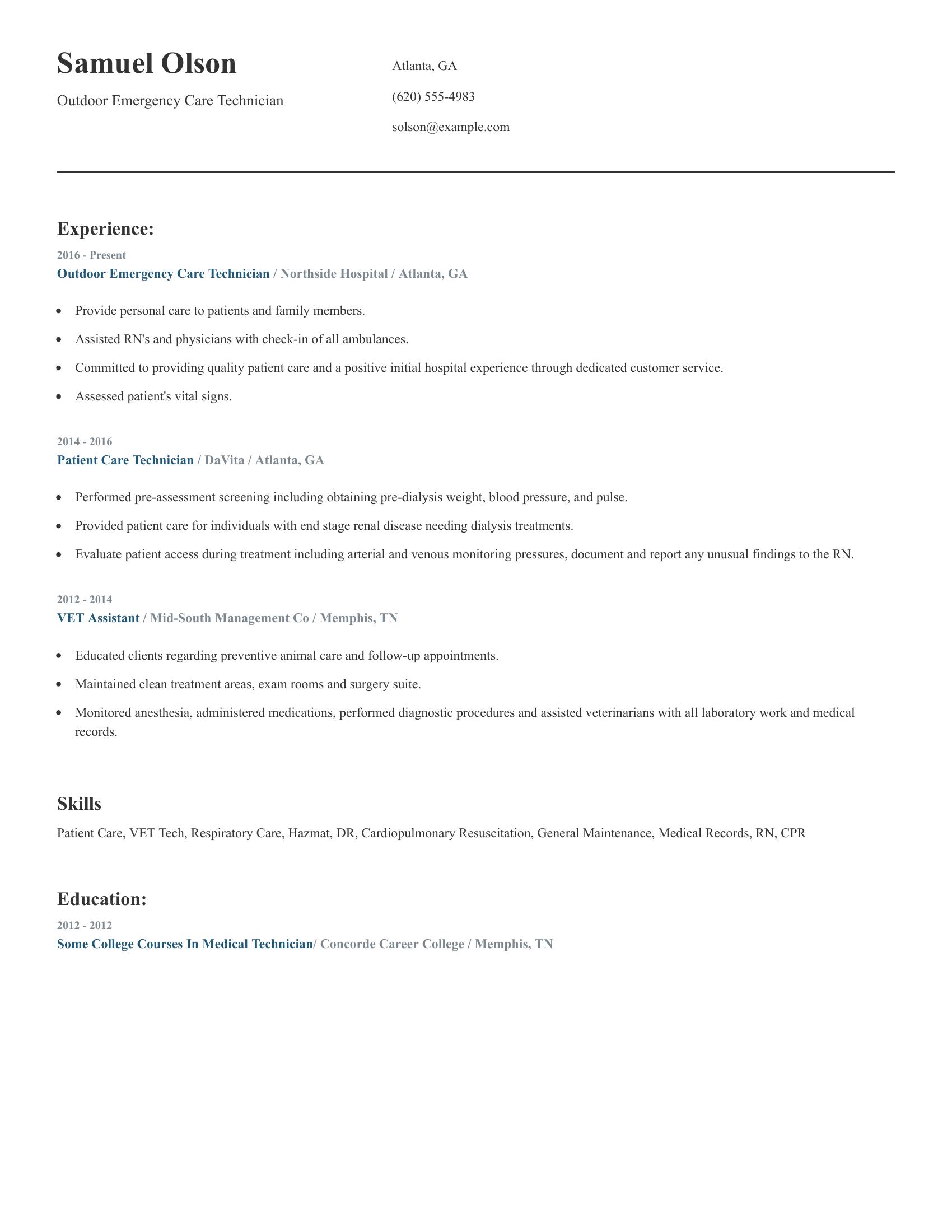
Emergency medical dispatcher resumes should highlight relevant experience and skills. They include job history in emergency services, proficiency in dispatch systems, and the ability to handle high-stress situations. Resumes should also show knowledge of public safety protocols, effective communication skills, and experience with emergency response procedures.
This resume included experience responding to emergency signals and dispatching services. It mentioned specific duties like contacting emergency responders, monitoring alarms, and using dispatch systems. The work history showed progression in relevant roles, from public safety officer to emergency medical dispatcher. Skills listed were pertinent to the job, such as handling emergency calls and security services.
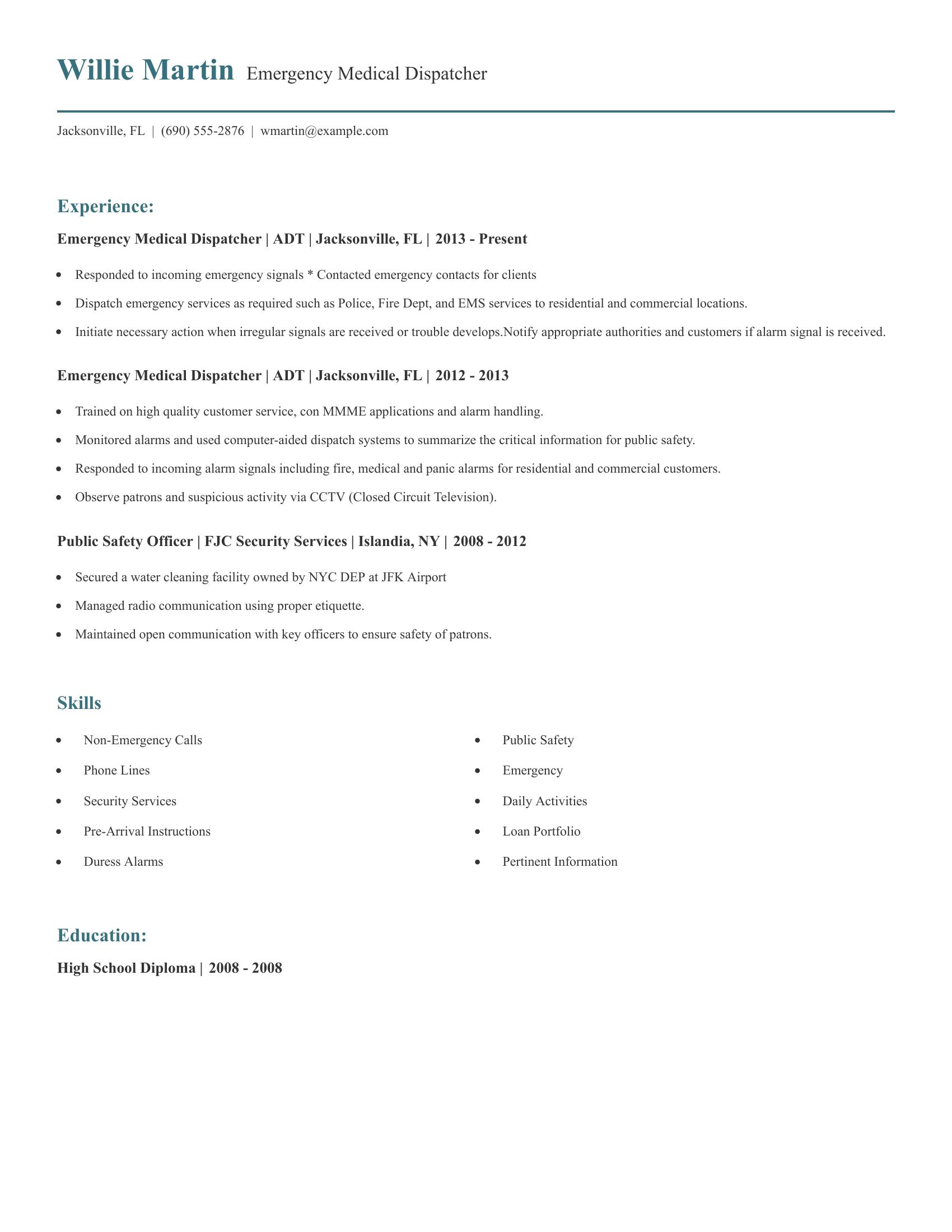
Emergency department technologist resumes should highlight relevant experience, skills, and certifications. They should include contact information, a concise summary of work history, specific job duties, and expertise in medical and technical skills. It's important to list certifications and training relevant to emergency medical services. Clear job titles and dates of employment are crucial for demonstrating experience.
This resume includes all necessary elements for an emergency department technologist. It lists contact information, a comprehensive employment history with job titles and dates, and specific duties performed in each role. Skills related to emergency medical services and technical expertise are clearly outlined. The resume also mentions relevant training and certifications, providing a complete picture of the candidate's qualifications.
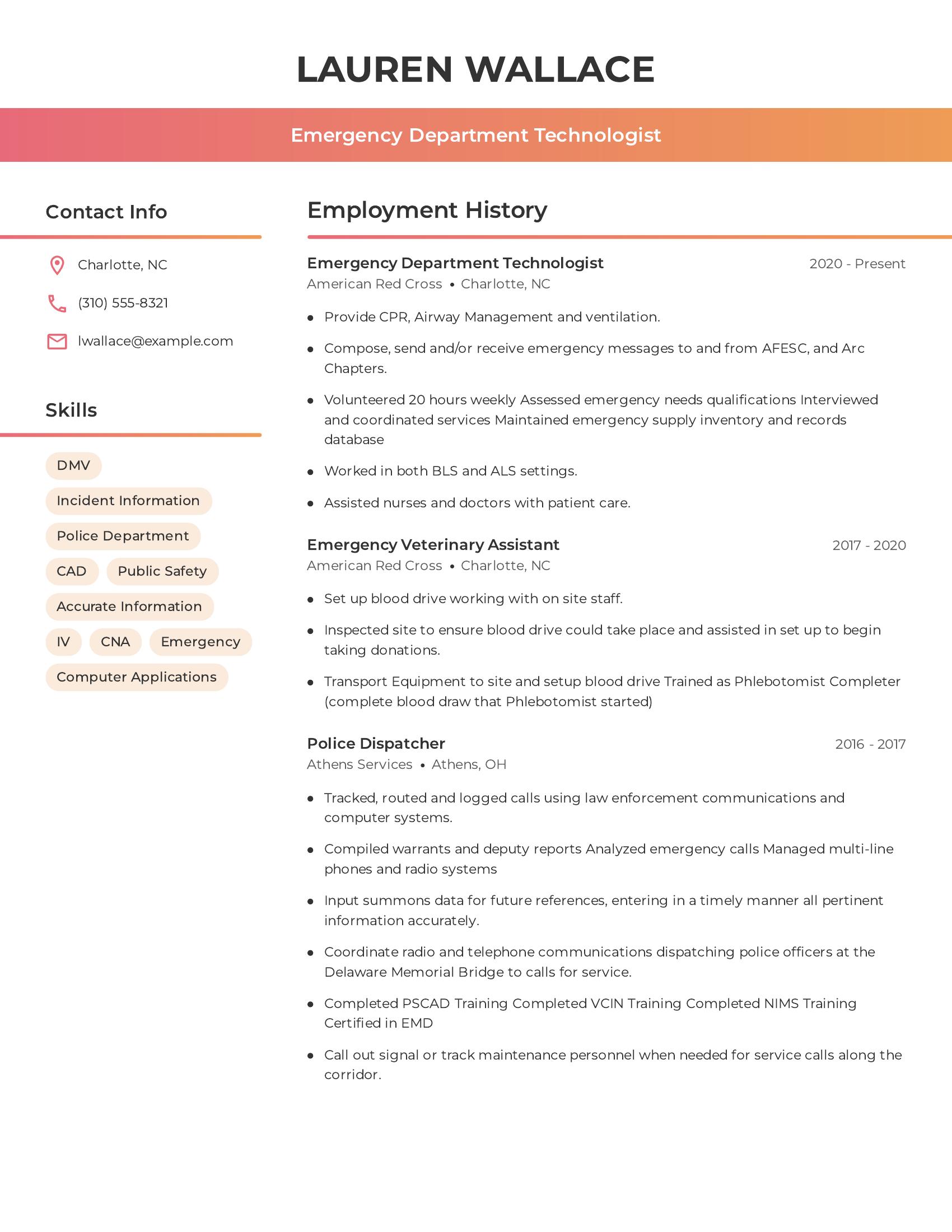
Emergency medical service coordinator resumes should highlight relevant experience, key responsibilities, and specific skills related to emergency medical services. A good resume includes job titles, employers, and dates of employment. It should also list specific duties and achievements that show expertise in the field. Education details and certifications relevant to the position are important as well.
This resume includes clear job titles and dates, which show a progression in the emergency medical service field. It lists specific duties such as establishing compliance programs and initiating insurance billing records. The resume also highlights experience in training employees and developing emergency management plans. Education credentials are clearly listed, showing advanced degrees in criminal justice.
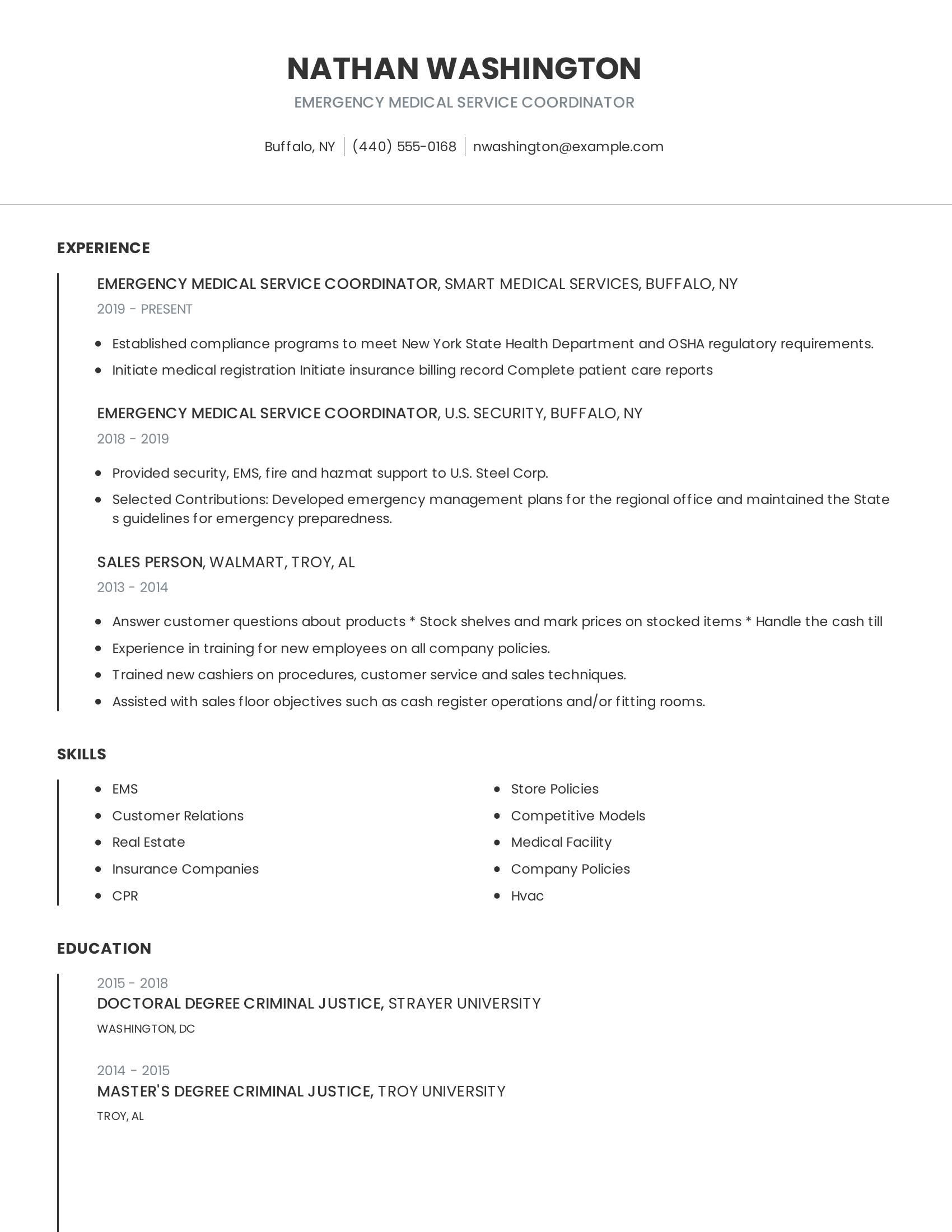
Emergency responder resumes should include specific elements like job experience, relevant skills, certifications, and contact information. Job experience should detail roles in emergency response, highlighting responsibilities and actions taken in critical situations. Skills like CPR, EKG monitoring, and patient care are important. Certifications such as EMT or paramedic should be listed. Contact information should be clear and easy to find.
This resume includes the necessary specifics. It lists job experiences from 2015 to the present, detailing responsibilities like administering medical treatments, transporting patients, and assisting medical staff. It mentions skills like CPR and EKG monitoring. The contact information is clear at the top of the resume, making it easy for employers to reach out.
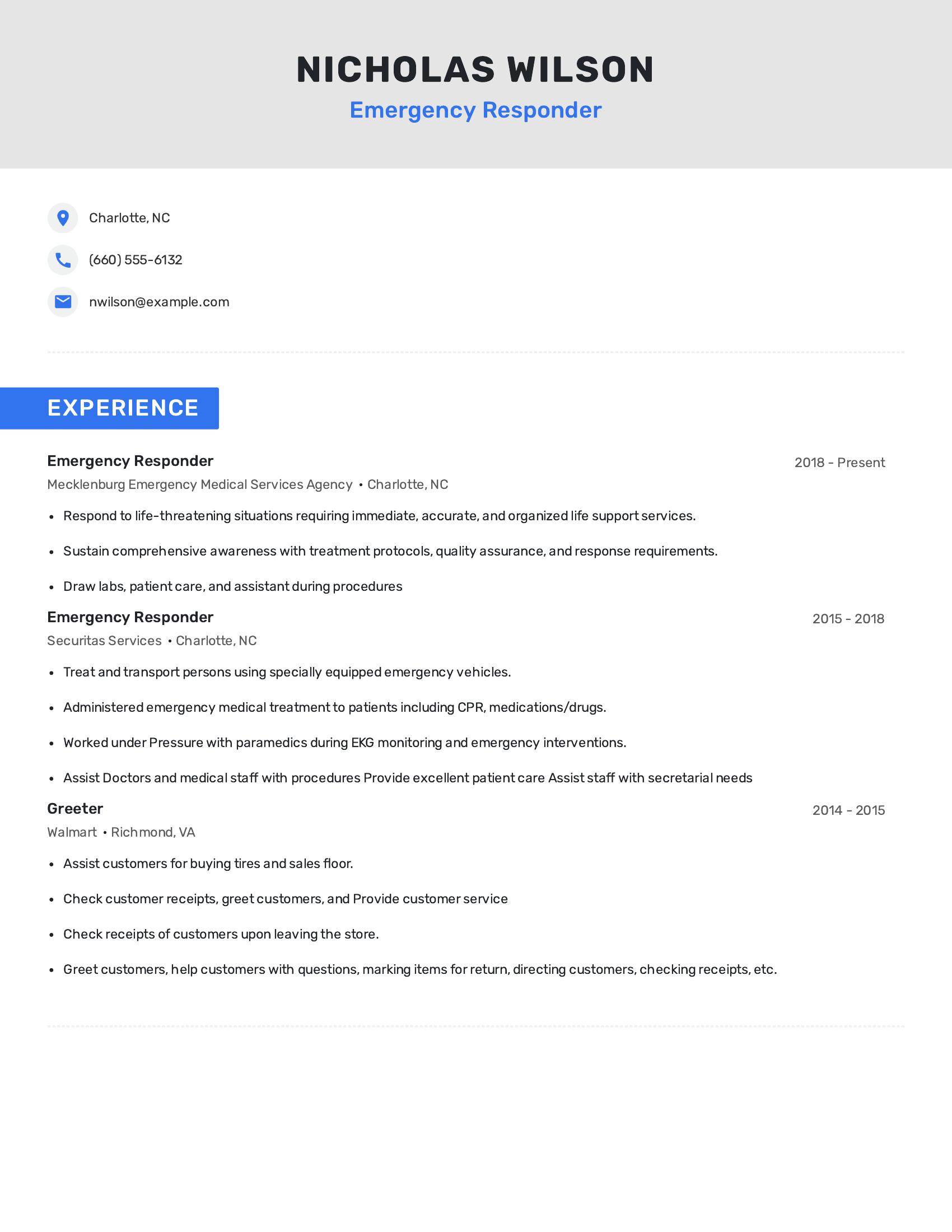
Firefighter/medic resumes should highlight relevant experience, certifications, and skills. They should demonstrate the ability to provide medical care, handle emergency situations, and perform basic life support. The resume should list work history with specific duties and achievements. Education and certifications like BLS (Basic Life Support) and ALS (Advanced Life Support) are important.
This resume includes detailed work experience as a firefighter/medic, showing a long career in emergency medical services. It mentions specific tasks like monitoring vital signs, patient transport care, and various life support techniques. The resume also lists certifications and relevant skills. The inclusion of a criminal justice degree adds depth to the candidate’s qualifications.
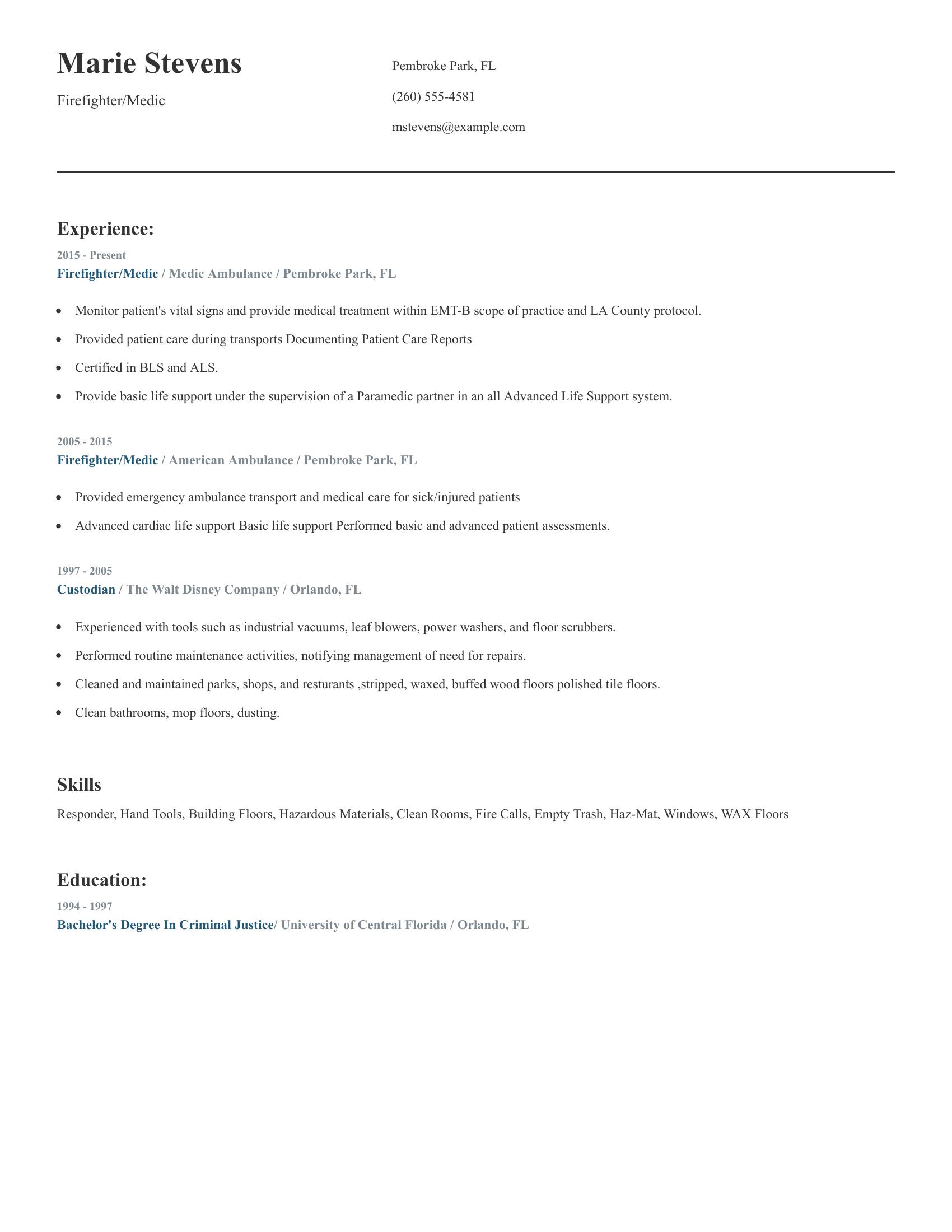
Emergency veterinary technician resumes should showcase experience in emergency animal care, ability to handle medical records, and skills in various veterinary procedures. Important elements include relevant job history, specific duties performed, and educational background. Skills like venipuncture, lab tests, and internal medicine should be highlighted. Experience working in high-pressure situations is also valuable.
This resume includes experience as an emergency veterinary technician and registered veterinary technician at a family medicine practice. It lists specific duties like nursing care, handling patient records, and training new techs. Important skills such as procedure management and animal care are mentioned. The educational background includes a master's degree in nursing, which is relevant to the role.
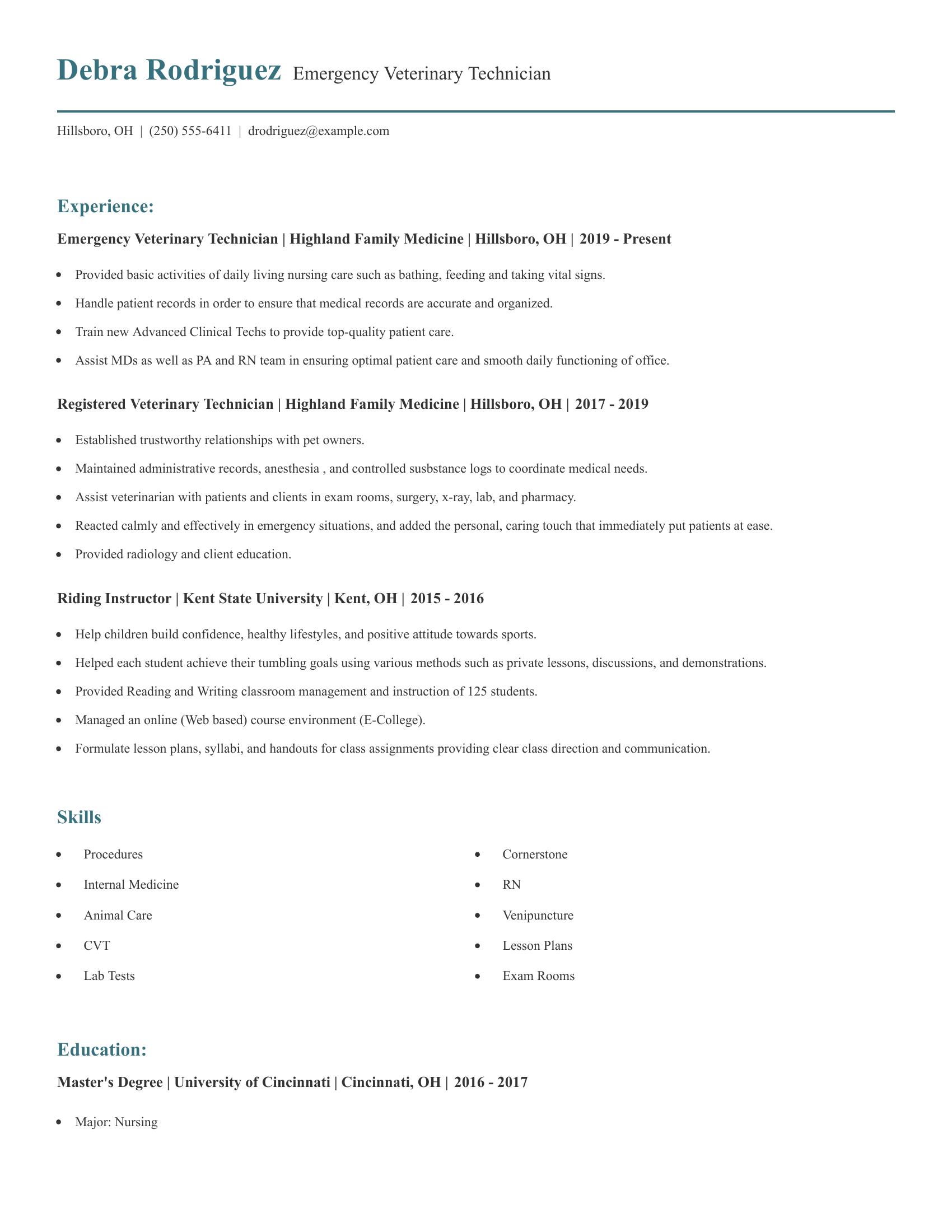
Emergency department volunteer resumes should include contact information, relevant skills, employment history, and education. Skills should focus on patient care, administrative tasks, and teamwork. The employment history must demonstrate experience in an emergency department or similar setting. Education should highlight any medical or healthcare-related qualifications.
This resume includes contact information and a detailed employment history showing volunteer roles in emergency departments. It lists relevant skills like administrative tasks and emotional support. The education section includes a psychology degree, which is useful for understanding patient behavior.
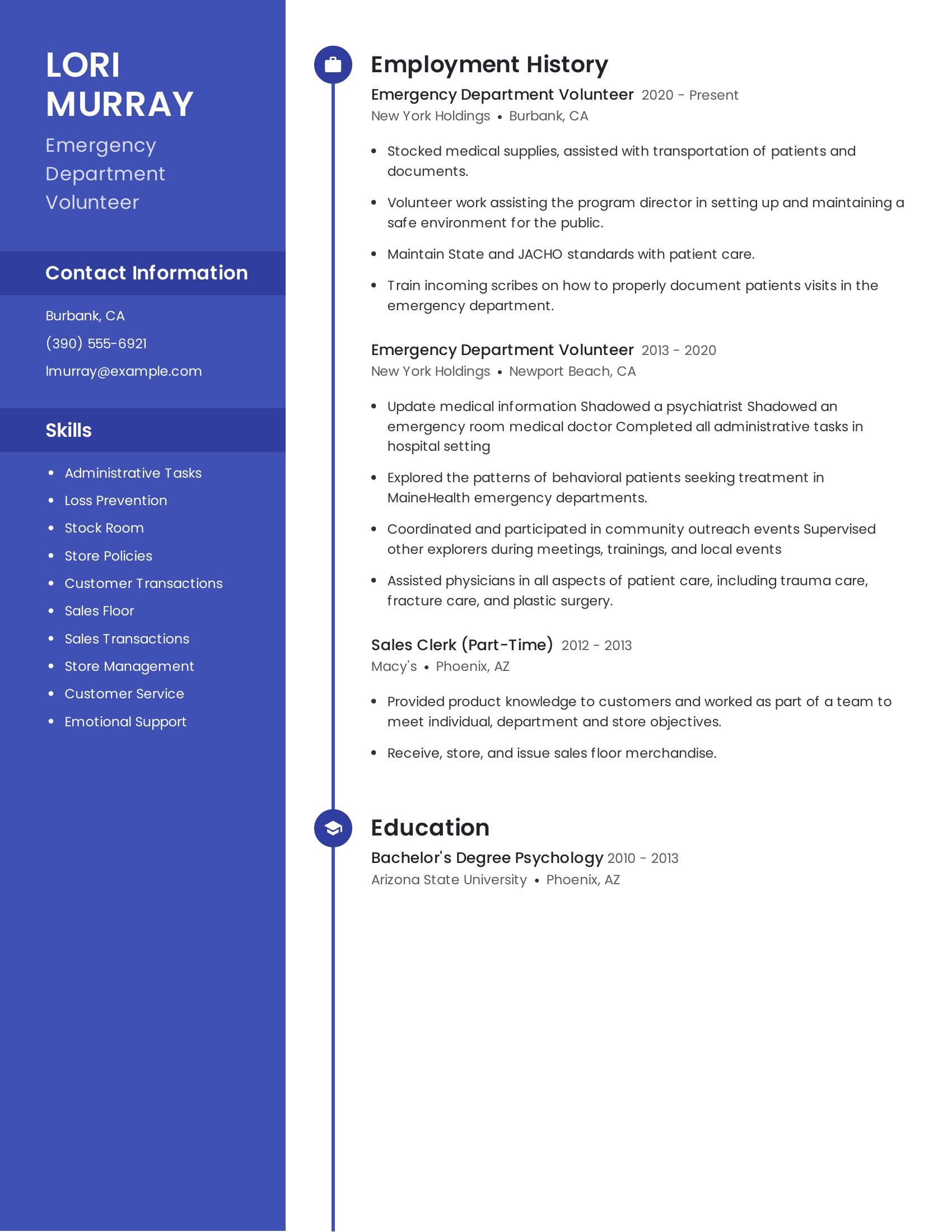
Medical service technician resumes should highlight relevant work experience, specific skills, and education related to the field. Key components include job titles, employers, locations, and dates of employment. Responsibilities and achievements should be listed clearly, focusing on patient care, medical procedures, and technical skills. The resume should also mention any formal education or certifications.
This resume includes specific job titles and detailed descriptions of tasks performed in each role. It shows a progression in the healthcare field with experience in patient care, emergency maintenance of medical instruments, and monitoring vital signs. Skills like ECG, catheter care, and diagnostic procedures are clearly listed. The education section mentions relevant coursework in nursing assistance.
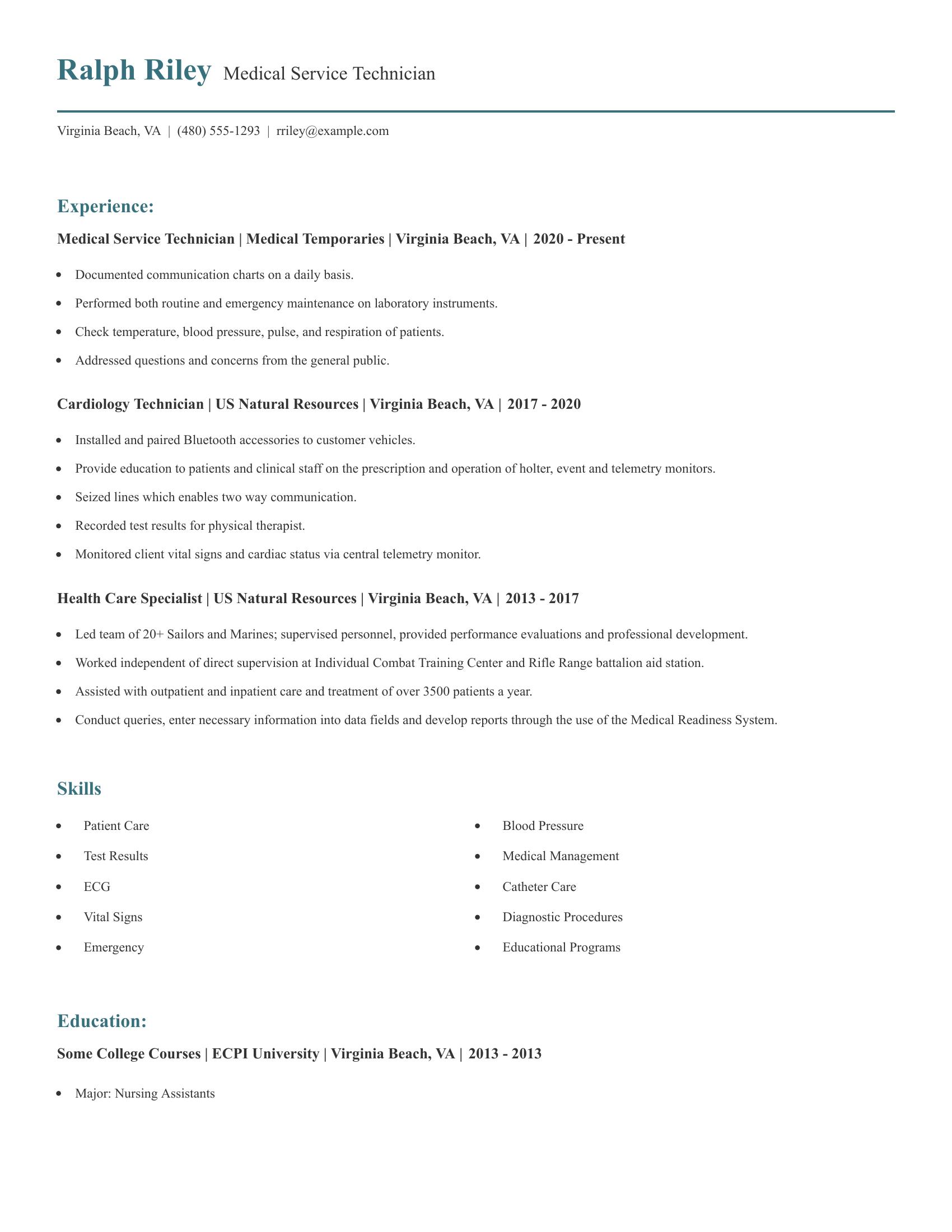
Ambulance driver resumes should highlight experience with emergency medical services, driving skills, and certifications. Important components include job titles, work history, and specific duties performed. Details about providing life support, operating under protocols, and following safety standards are crucial. Certifications in EMT or CPR and knowledge of regulations add value.
This resume includes relevant job experience such as working as an ambulance driver and attendant. It details responsibilities like providing emergency care, performing life support, and following state protocols. Previous roles also show experience in firefighting and conducting safety presentations, which adds to the candidate's qualifications.
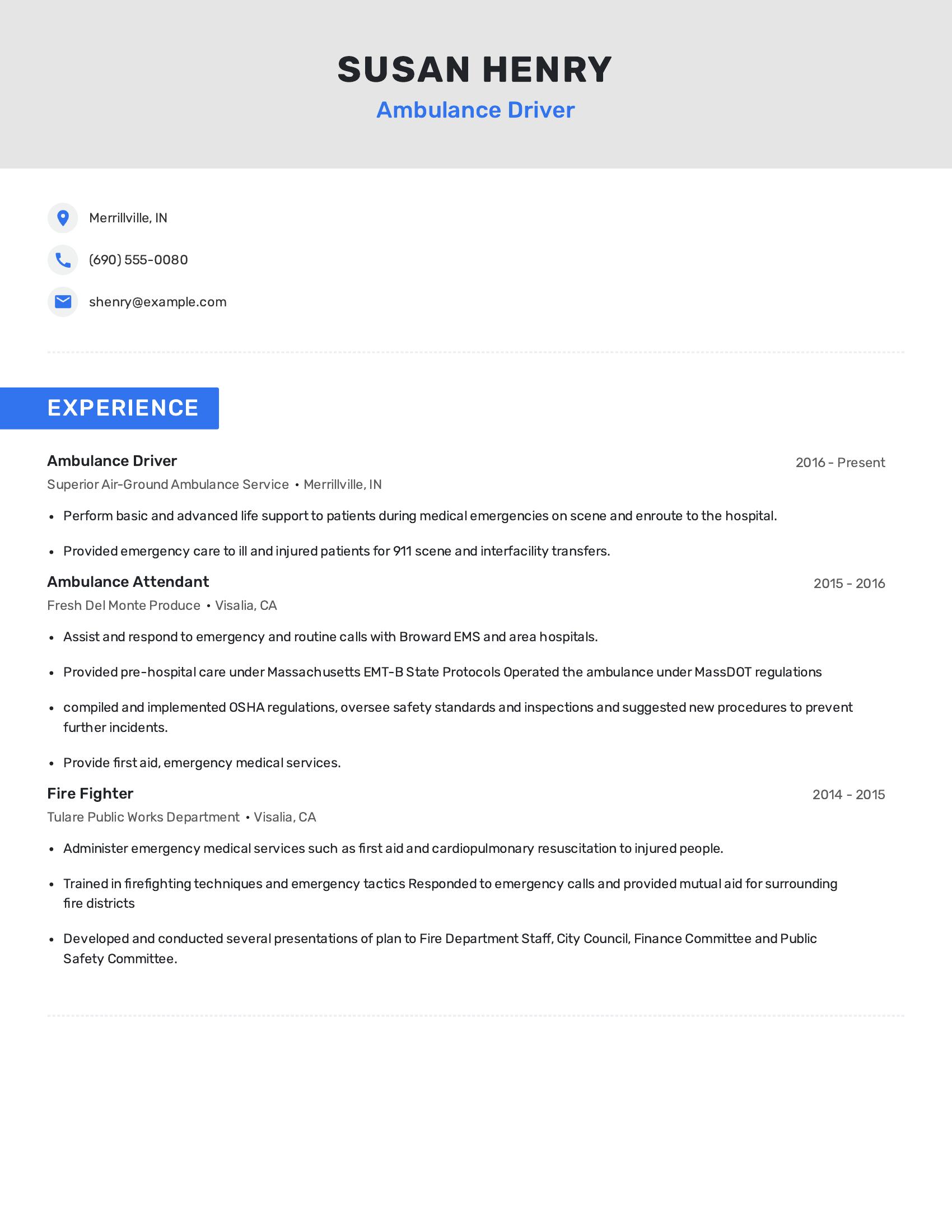
Combat medic resumes should focus on relevant experience, skills, and education. Important elements include emergency response capabilities, medical care proficiency, patient documentation, and communication skills. Clear descriptions of duties performed in previous roles help demonstrate competence. Listing relevant skills and any related education shows preparedness for the job.
This resume includes specific duties such as responding to emergency calls, monitoring vitals, and providing medical care. It highlights communication with military personnel and experience in frontline troop health care. The resume lists relevant skills like medical management and EKG knowledge, along with some college coursework in health sciences.
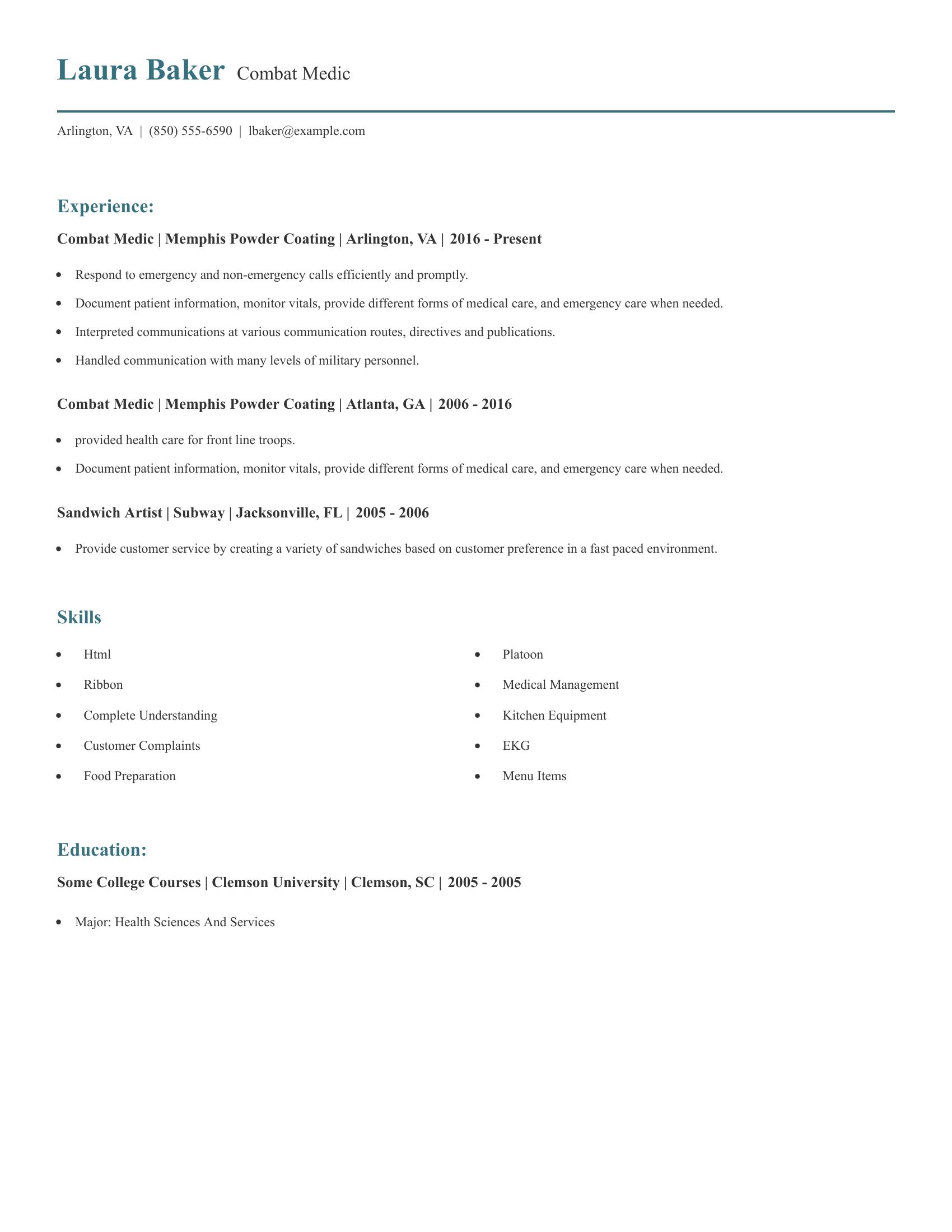
Emergency department registered nurse resumes should highlight relevant work experience, clinical skills, and educational background. Key elements include job titles, responsibilities, and the timeline of work history. Certifications and specialized training are important. The resume should clearly show competence in patient care, coordination with healthcare teams, and proficiency in emergency procedures. It's also helpful to mention any leadership roles or additional skills.
This resume includes a detailed work history with specific duties performed at each position. It mentions experience in patient care coordination, advanced medication administration, and family education. The resume lists a clear timeline of employment and includes relevant roles such as charge nurse and nursing assistant instructor. It also mentions a master's degree in nursing, which is crucial for advanced practice roles.
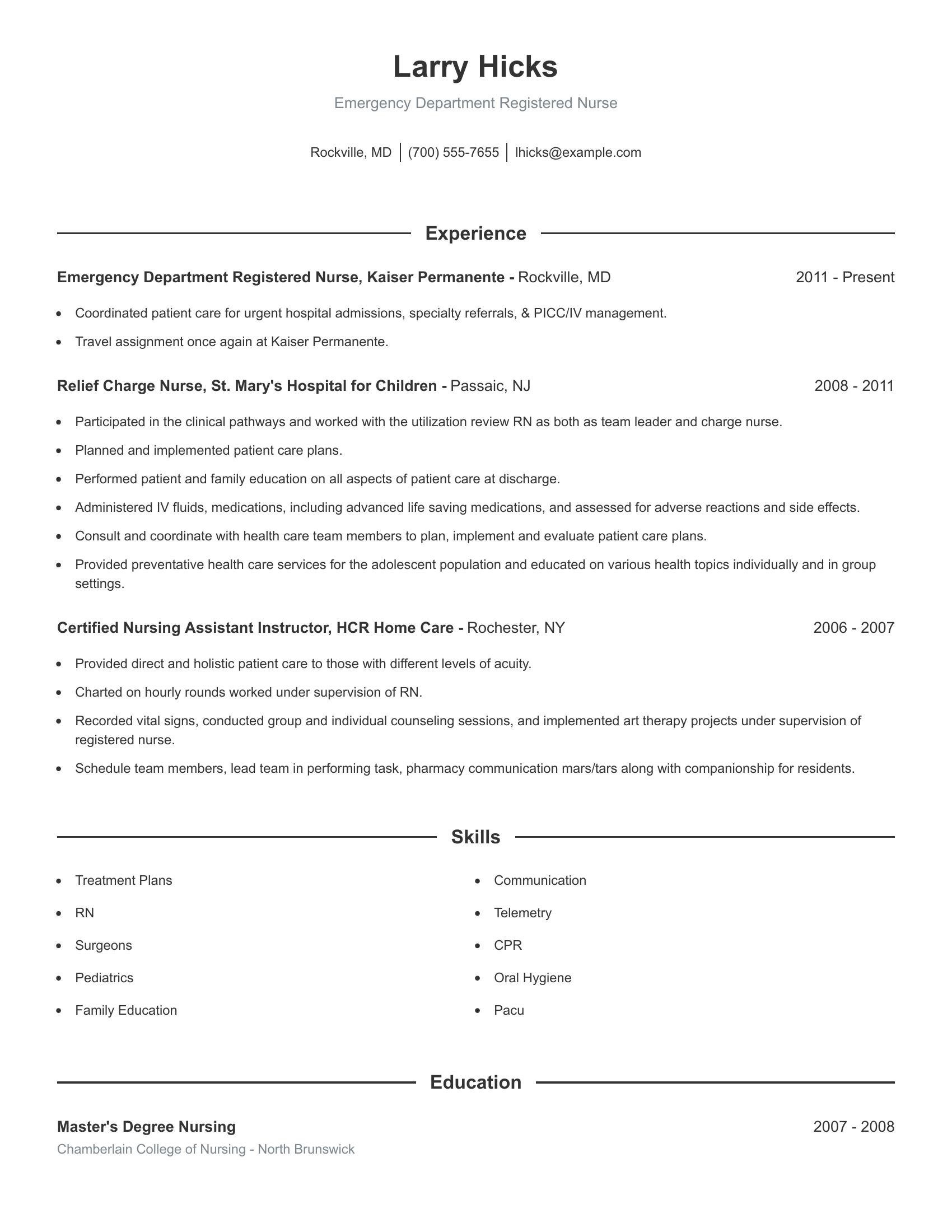
List relevant certifications and licenses. Include your EMT certification, CPR certification, and any specialized training like Advanced Cardiac Life Support (ACLS).
Highlight hands-on experience. Mention specific duties like patient assessment, emergency care, and transportation to medical facilities.
Showcase teamwork and communication skills. Describe how you work with paramedics, nurses, and doctors to provide patient care.
An emergency medical technician's resume should have specific sections to show their skills and experience. Contact information should be at the top. A summary or objective should briefly describe career goals and relevant skills. The work experience section should list jobs related to emergency medical services with specific duties and achievements. Education should include relevant degrees and certifications like CPR and EMT-Basic. Skills should list both technical and soft skills like patient care and communication. Finally, add any volunteer work related to healthcare.
A strong emergency medical technician summary highlights experience, skills, and certifications. It should be concise but cover important points.
Writing a good resume summary can make you stand out. Follow these tips for best results.
A well-written emergency medical technician experience section should focus on specific tasks and accomplishments.
Follow these tips for writing a standout emergency medical technician experience section.
These skills help you perform your job duties effectively and safely.
These skills help you interact well with patients and colleagues.